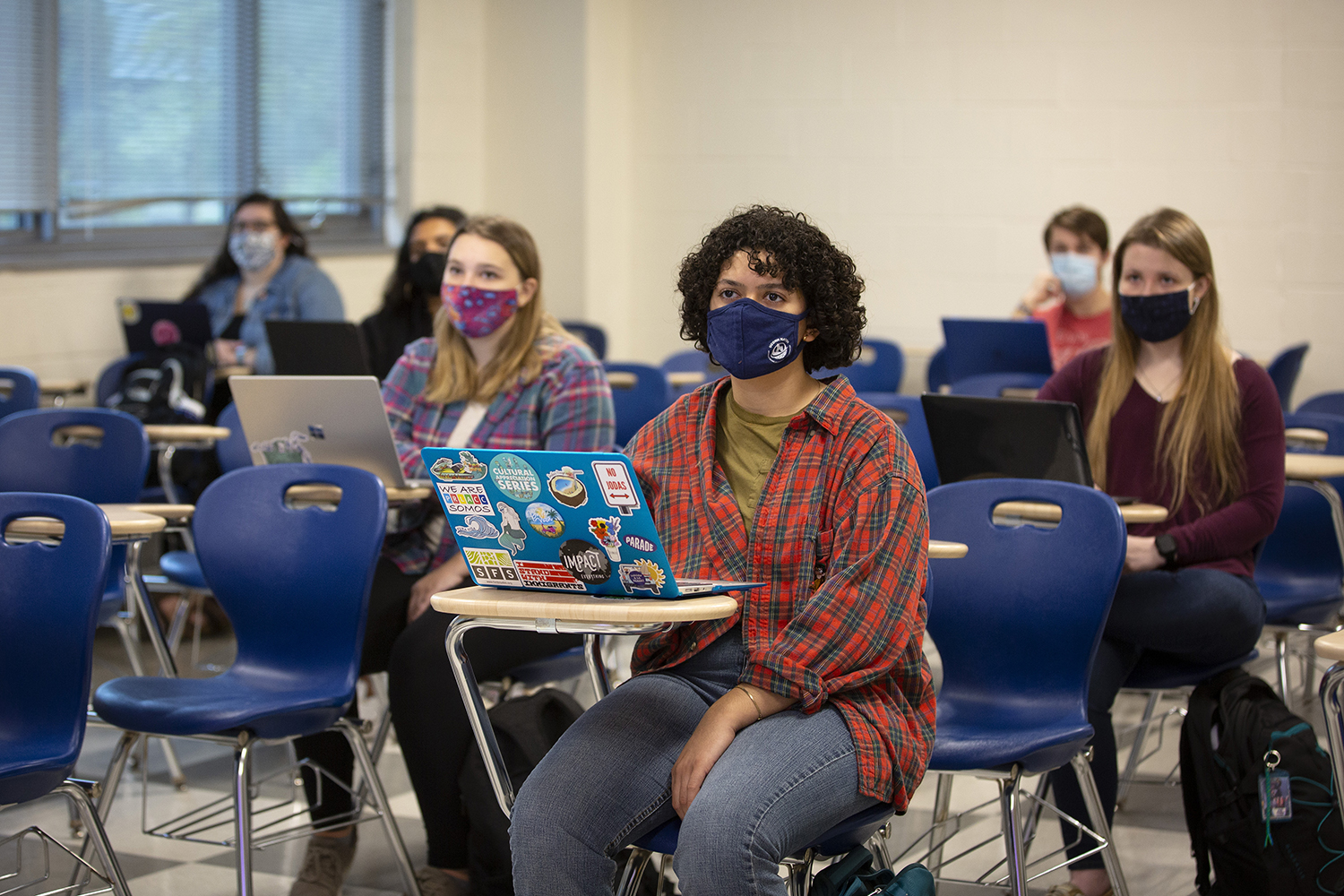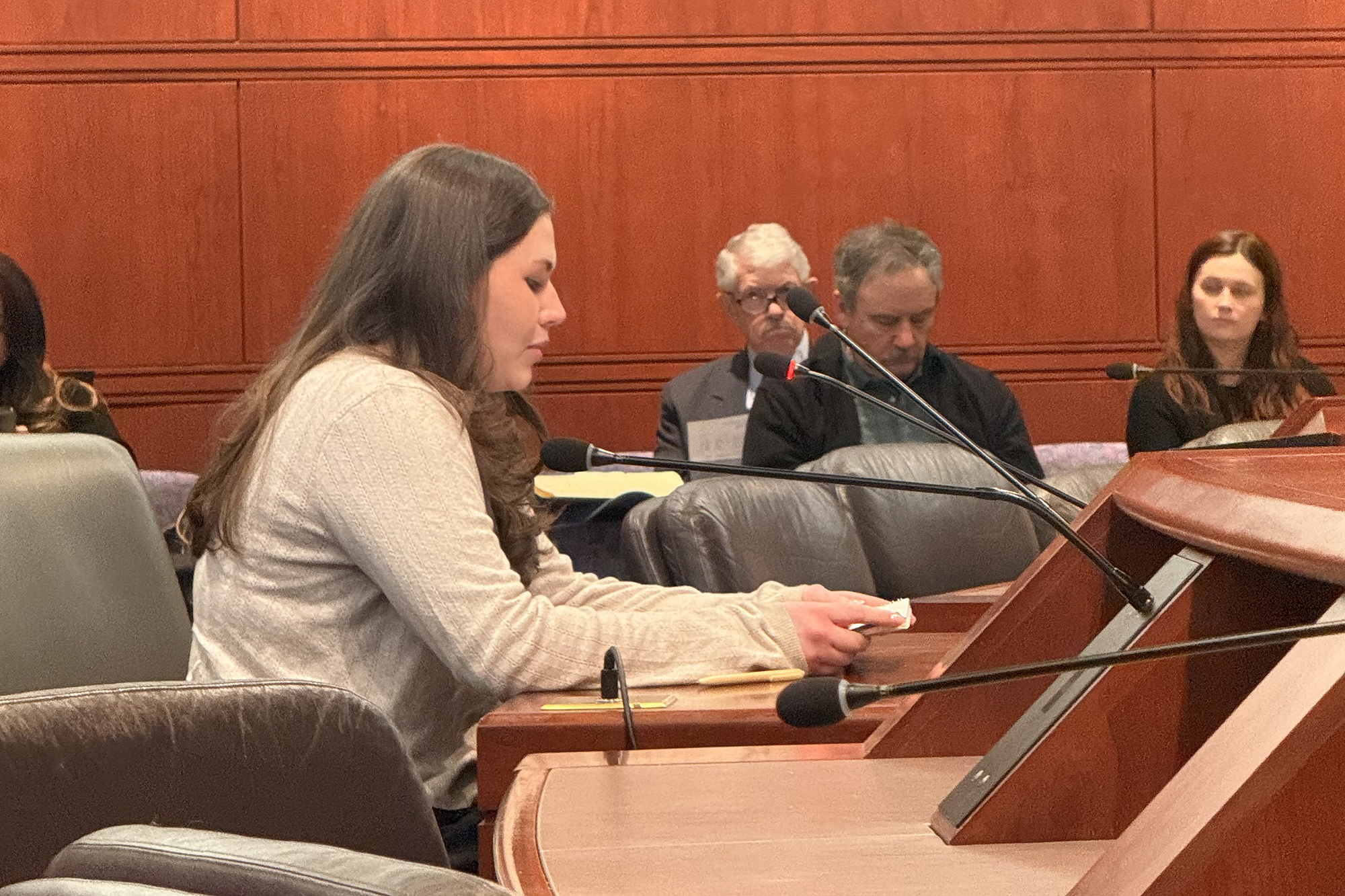UConn is now halfway through the fall semester and has successfully adopted new classroom solutions to improve learning and keep students safe during the COVID-19 pandemic.
Much of this success is thanks to the educators in the College of Liberal Arts and Sciences (CLAS), says Juli Wade, dean of the College.
“Our instructors have worked tirelessly to provide not only for the needs of CLAS majors, but also for the more than 95 percent of UConn students who take courses in our College,” says Wade. “I’m immensely proud of their efforts this semester.
The University spent months preparing the campus to reopen for classes this fall. Efforts included marking shared spaces like classrooms and dorms and putting in place community guidelines for UConn’s five campuses.
CLAS professors, graduate assistants, and support staff also made significant adjustments to undergraduate and graduate-level courses, preparing multiple lesson plans to meet the needs of in-person and distance learners.
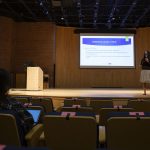
A course instructor leads a class on a large stage.
PSYC 2300: Abnormal Psychology
Jaime Blackmon, a Ph.D. student in the Department of Psychological Sciences, instructs PSYC 2300: Abnormal Psychology in von der Mehden Recital Hall. Sixty students are enrolled in the course, but typically 10-30 students attend in person. The remaining remote learners participate via live stream and chat features in Blackboard Collaborate and Kaltura.
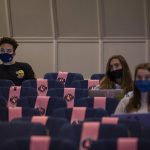
Students sit at a distance in a large lecture hall.
PSYC 2300: Abnormal Psychology
Seats in large lecture halls are marked with signs indicating where students can sit to maintain a safe distance. (Bri Diaz/UConn Photo)
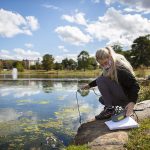
A student measures physiochemical conditions in Mirror Lake.
GSCI 4130: Geomicrobiology
Breanna Felt ’21 (CLAS), an ecology and evolutionary biology major, monitors the water temperature and conductivity in Mirror Lake during GSCI 4130: Geomicrobiology. The class typically includes a three-day camping trip in Upstate New York, according to course instructor Pieter Visscher, a professor of geosciences and marine sciences. This year students will instead rely on trips to Mirror Lake, a coastal Connecticut salt marsh, and the Avery Point campus.
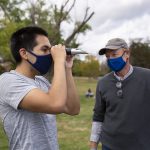
A student uses lab equipment while an instructor looks on.
GSCI 4130: Geomicrobiology
Professor of Geosciences and Marine Sciences Pieter Visscher instructs Jason Jara ’22 (CLAS), a chemistry and geosciences major, on how to use a refractometer to measure the dissolved salts in Mirror Lake. Online labs can work well, says Visscher, but courses with mostly seniors have distinct in-person advantages, allowing students to get hands-on experience with equipment and gather and interpret their own data.
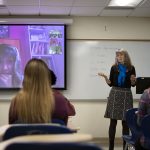
A professor leads a class wearing a face shield, while a guest speaker is projected on a screen in the background.
HIST/LLAS 1570: Migrant Workers in Connecticut
Anne Gebelein, associate professor in residence and associate director of El Instituto: The Institute of Latino, Caribbean and Latin American Studies, leads a discussion in HIST/LLAS 1570: Migrant Workers in Connecticut, joined by guest speaker Karen Garrido ’14 (CLAS). Garrido spoke about her activism and experience as a social worker at Safe Passage Project, a New York City-based nonprofit that provides resources to children seeking asylum in the U.S. (Bri Diaz/UConn Photo)
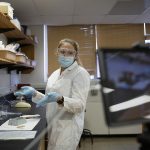
A course instructor demonstrates a lab activity while being recorded on a tablet.
MCB 2610: Fundamentals of Microbiology
Molecular and cell biology Ph.D. student Ashley Reed demonstrates a lab activity for an upcoming section of MCB 2610: Fundamentals of Microbiology. Some in-person classes provide video demonstrations that walk students through activities to limit time in class, Reed says.
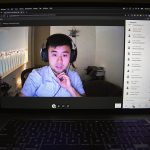
A computer screen showing a virtual class in progress.
MCB 2000: Introduction to Biochemistry
Andong Li, a graduate student the Department of Molecular and Cell Biology, uses Blackboard Collaborate to instruct an online lab section of MCB 2000: Introduction to Biochemistry. Students in MCB 2000 attend labs in person every other week with adjustments that encourage physical distancing and safety. (Bri Diaz/UConn Photo)
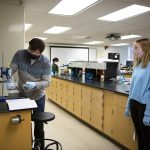
A graduate assistant sets up a lab course.
MCB 3010: Biochemistry
Joshua Calabrese, a molecular and cell biology graduate student, sets up a lab activity during MCB 3010: Biochemistry. Almost a third of lab courses that serve advanced CLAS majors and students across UConn continue in person this semester with adjustments that encourage physical distancing and safety.
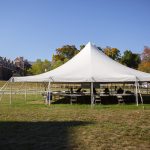
A large tent on the South Campus quad.
Tents at South Campus
Some classes get creative with outdoor space, utilizing tents put up by dining services throughout campus, like this one on the South Campus lawn. (Bri Diaz/UConn Photo)
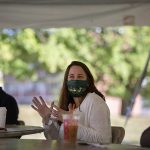
A professor leads an graduate seminar under an outdoor tent.
PSYC 5301: Practicum in Interviewing and Cognitive Assessment
Professor of Psychological Sciences Inge-Marie Eigsti leads a discussion of PSYC 5301: Practicum in Interviewing and Cognitive Assessment in a tent outside of South Campus. The class of seven clinical psychology students meet in person each week. The students also practice administering and interpreting clinical interviews throughout the semester via videoconference and in-person sessions with clients.
About 75% of courses that are traditionally taught in a classroom are being offered entirely online this semester. These courses rely on digital platforms like Blackboard Collaborate and Kaltura to engage students through recorded lectures and virtual assignments.
The remaining courses look significantly different. Students are spread apart, with signs encouraging physical distancing on desks in classrooms and seats in large lecture halls. Students and instructors wear face coverings. All in-person classes are also structured to accommodate students who are remote or temporarily in quarantine, often with real-time video streams and live chats.
Approximately 30% of all laboratory classes with hands-on components take place in person, with activities split and schedules staggered to allow for more physical distancing. Some labs take advantage of outdoor spaces on campus to give students experience with tools and processes important to their fields.
Despite these logistics, students and instructors alike have shown incredible commitment to a new way of learning, says Wade.
“The high quality of scholarly interactions we’ve seen in classrooms and virtually has been possible because both our students and faculty committed to creating inclusive spaces where knowledge can continue to flow,” Wade says.
